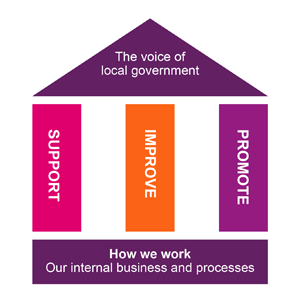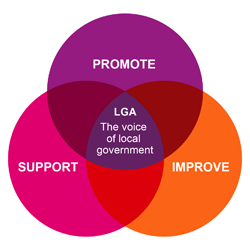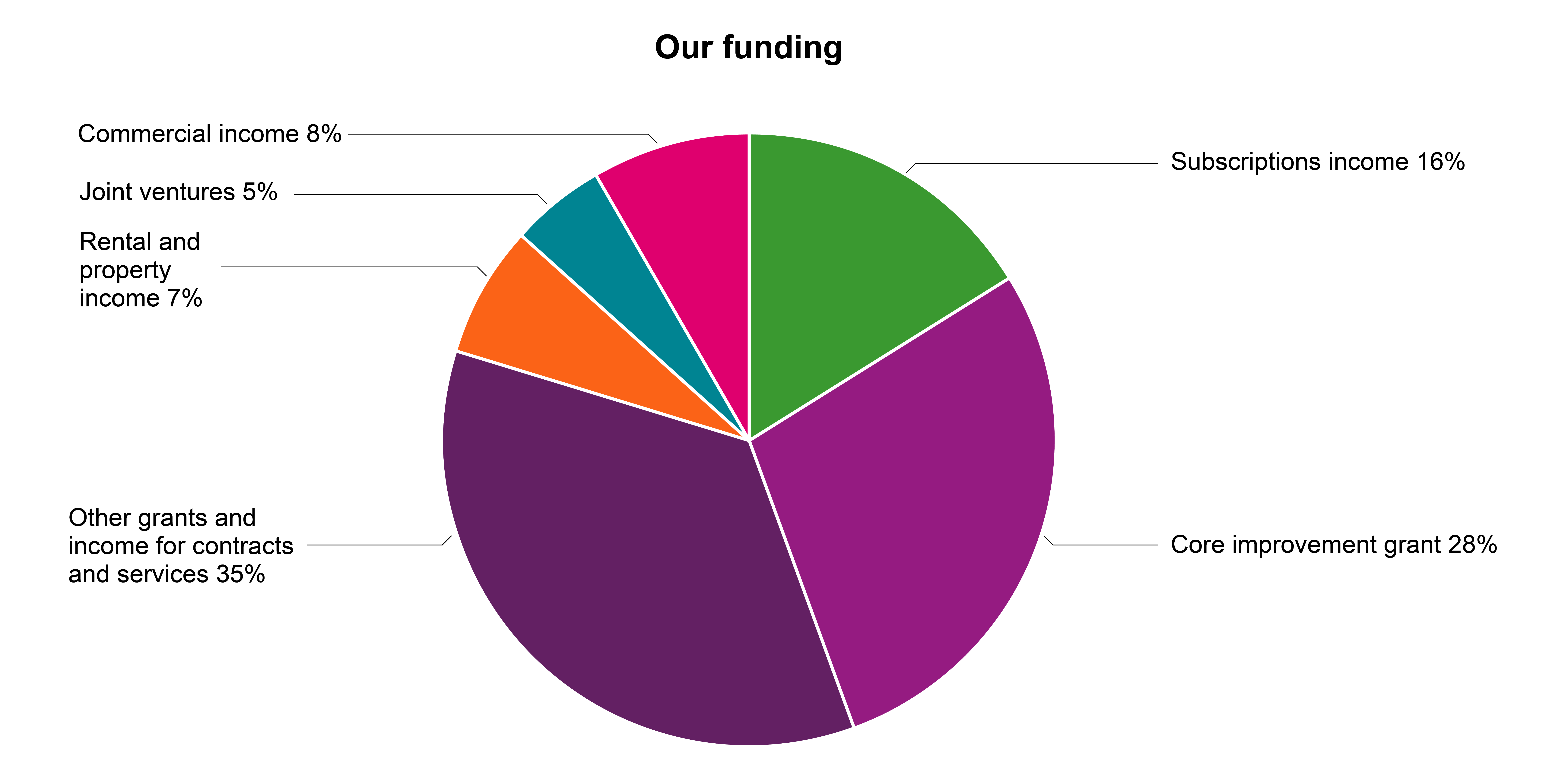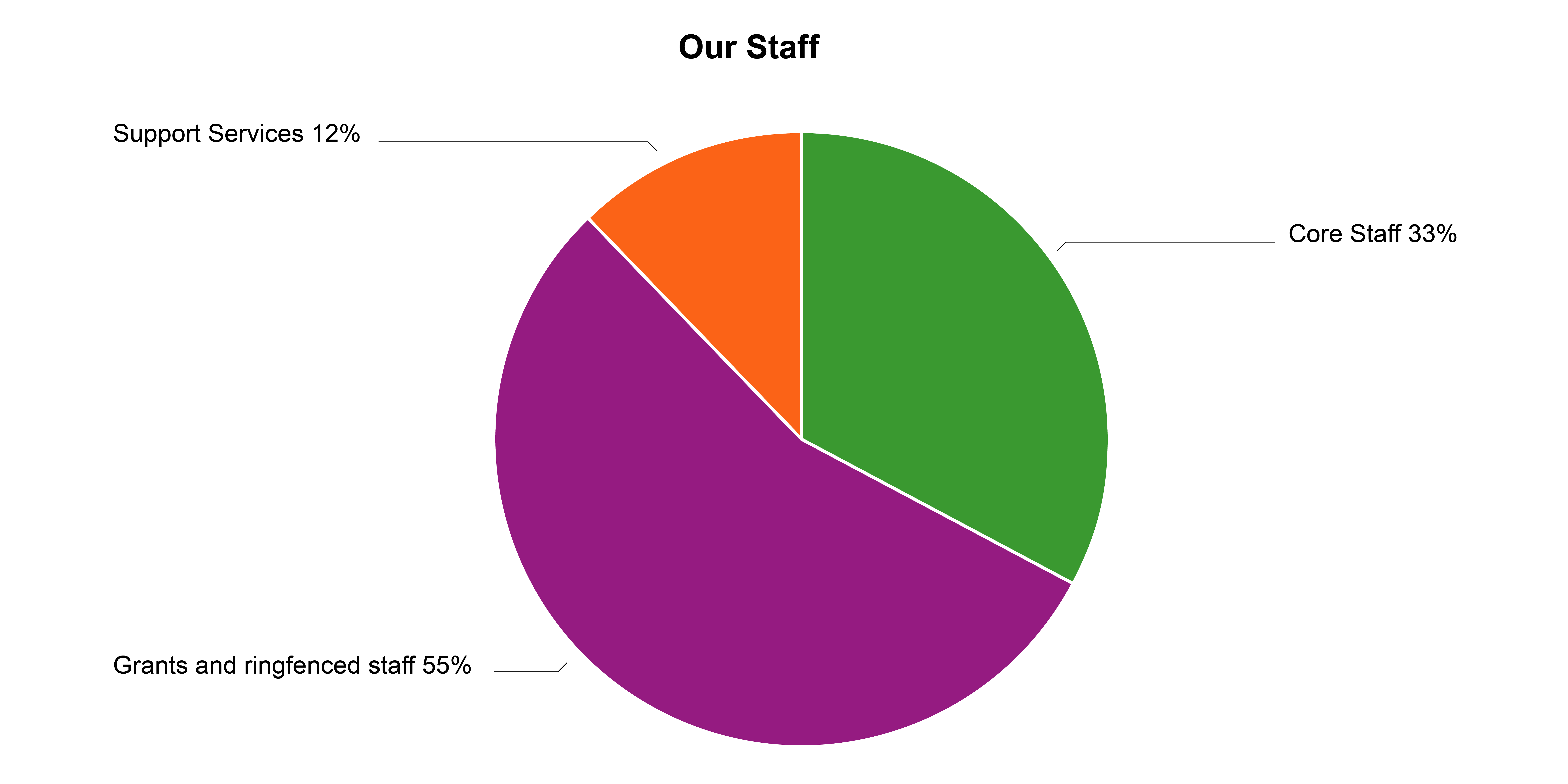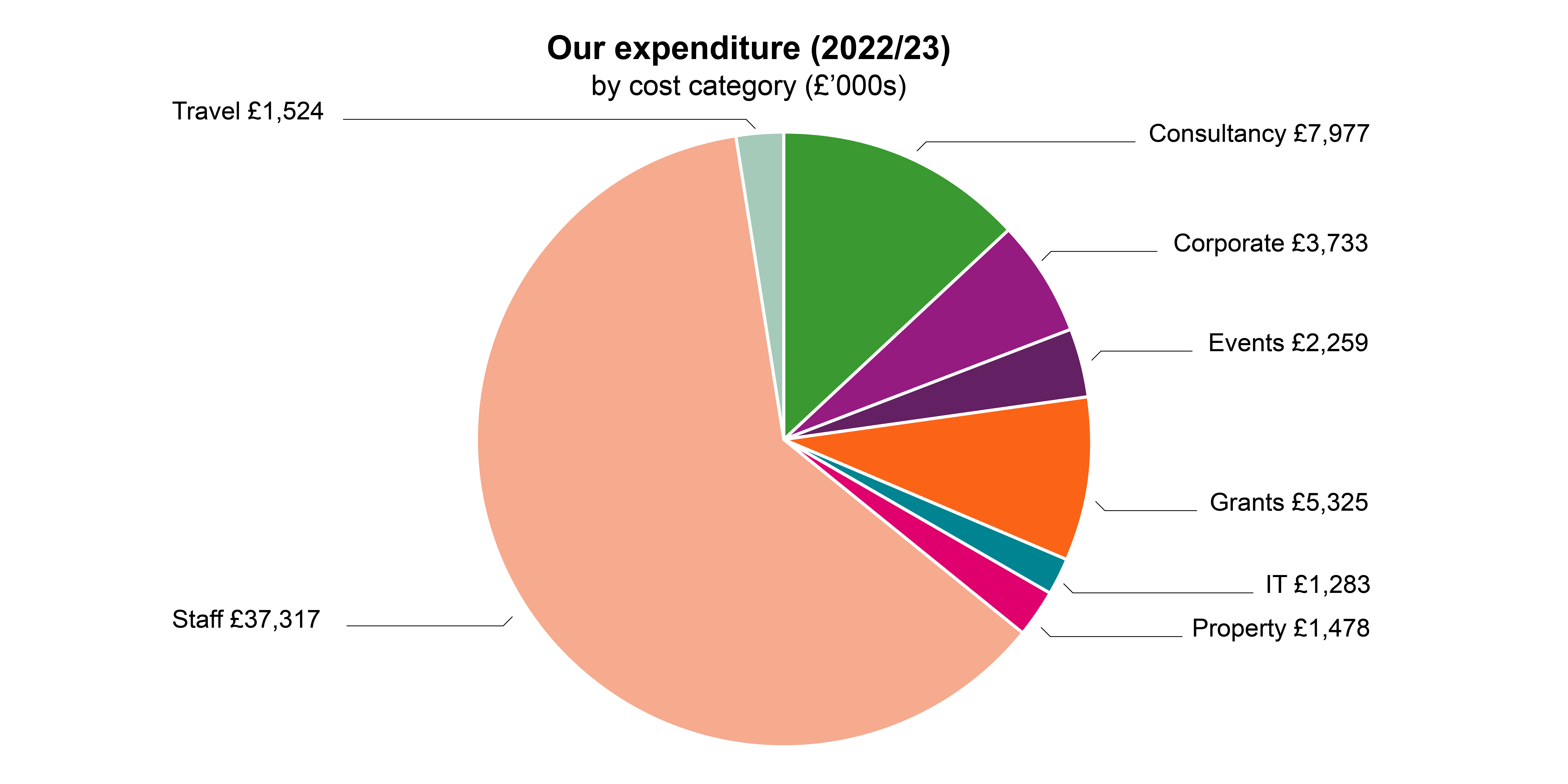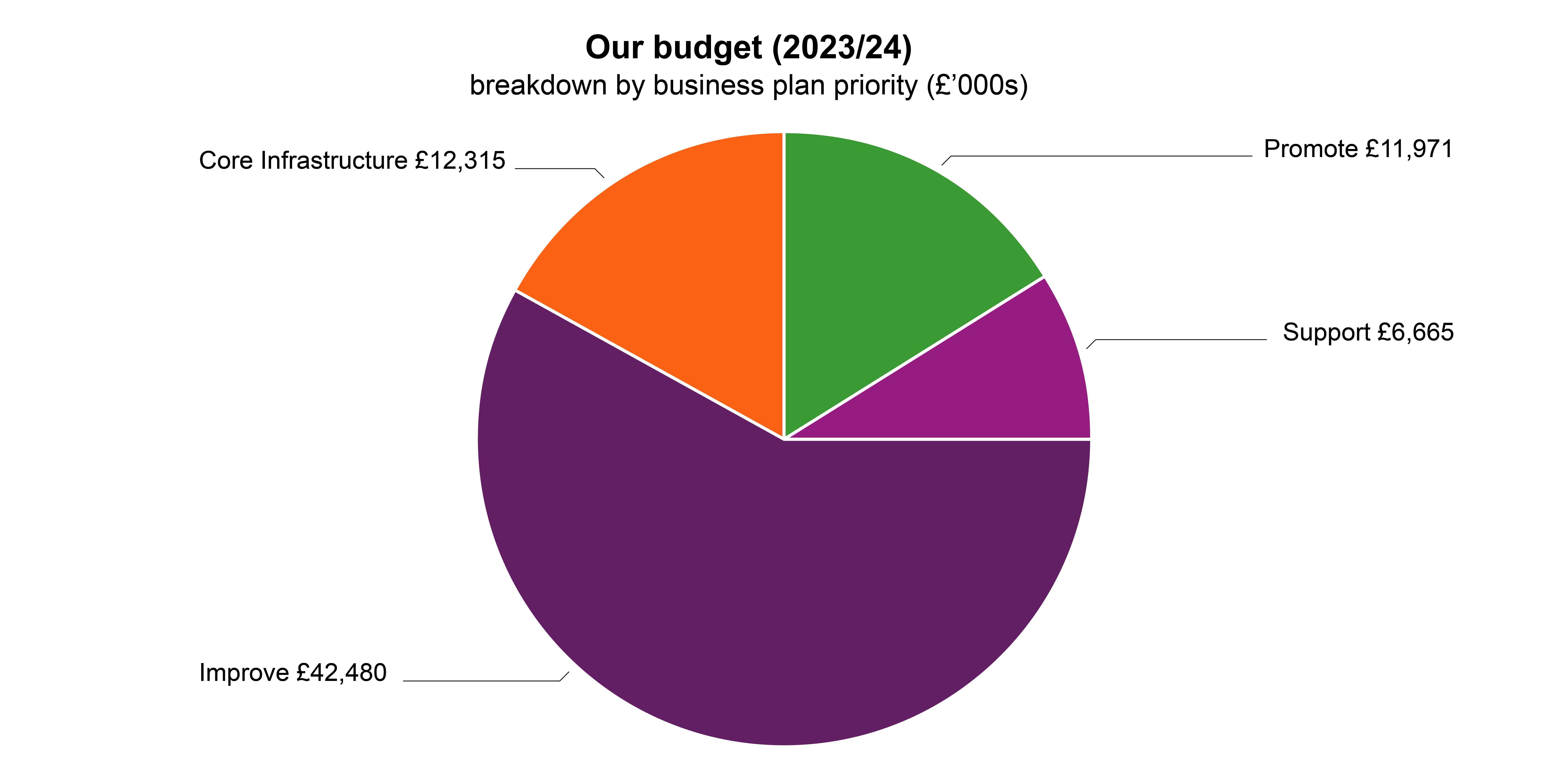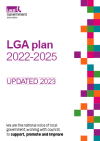
The voice of local government
Introduction
The LGA Plan 2022-2025 was developed by a cross-party Task and Finish group commissioned by the LGA Board, with contributions from the nine policy/improvement boards. It was approved by the LGA Board in September 2023 and forms the basis of the work programmes for all our boards.
The plan is reviewed and updated annually to reflect the latest priorities and commitments of the LGA’s political leadership, informed by the priorities of our membership.
In July 2023, the new Board of Directors of the LGA was elected. The Board continues to support the themes and commitments set out in the three-year plan but has highlighted four areas for particular focus over the coming year.
- A White Paper for Local Government – our manifesto for the next Government.
- Supporting Care Leavers – our commitment to those leaving care and with care experience.
- Driving improvement and assurance – our improved sector-led improvement framework supporting councils to be the best.
- One LGA, One Voice – our organisational change programme, equipping us to be the best membership organisation we can be).
Running through all of these is our commitment to be the best membership organisation we can be – relevant, financially resilient and speaking out with authority on behalf of the sector that we represent.
The plan is divided into five parts:
Part 1 - about the LGA
Part 2 - promoting local government
Part 3 - improving local government
Part 4 - supporting local government
Part 5 - our business: how we work
Part 1 – about the LGA
The LGA is the national voice of local government. We’re on the side of councils: promoting their work, supporting them to improve and helping them make a difference to people, places and the planet. This is both our vision and the golden thread that runs throughout this three-year plan.
We aim to be the best membership organisation we can be. As the national membership body for local authorities, we provide the bridge between central and local government and we help councils deliver the best services to their local communities.
Our core members are English councils in full membership and Welsh councils in corporate membership through the Welsh LGA. Our Associate members include fire and rescue authorities (FRAs), fire, police and crime commissioners (FPCCs and PCCs), national parks authorities and town and parish councils through their membership body National Association of Local Councils (NALC).
Over the period of this business plan, we intend to strengthen our representation of local government by working more closely with combined authorities and their elected mayors and with PCCs and PFCCs and their membership body, the Association of Police and Crime Commissioners.
Our purpose
We exist to promote, improve and support local government.
We are politically-led and cross-party and we work to give local government a strong, credible voice with national government and across the political parties. Supported by our team of experts covering every area of local government activity, we influence and set the political agenda on the issues that matter to our members so they can deliver local solutions to national problems.
We know that priorities change and that we need to stay relevant to all our membership. We work across the breadth of local government, drawing in every tier of interest to promote and defend the reputation of the sector, focusing our efforts where we can have real impact.
Our improvement programmes are sector-led and peer-based. Using expertise drawn from the sector, we build councils’ capacity to improve, so they can drive sustainable growth, deliver better public services and empower communities.
Parts 2 - 4 of this business plan set out our priorities to promote, improve and support local government.
Our business – how we work
Delivering on our ambition to be the voice of local government demands an efficient, well-managed and financially resilient business and a reputation for delivering high quality and value for money. Our internal business priorities are set out in part 5 of this business plan.
The context
LGA group funding 2023/24
- 16 per cent of our funding comes from the subscriptions of our member councils
- 28 per cent of our funding comes from the improvement grant from the Department for Levelling Up, Housing and Communities (DLUHC)
- 35 per cent of our funding comes from other central government grants and contracts
- 7 per cent of our funding is rental and commercial income from our two central London buildings – 18 Smith Square and Layden House Farringdon
- 5 per cent of our funding comes from our joint ventures – GeoPlace and Local Partnerships
- 8 per cent of our funding comes from our other commercial activities, including our conference and events programme and consultancy services.
Our staff
- 55 per cent of LGA staff are funded from grants and ringfenced programmes
- 33 per cent are core funded, which includes subscription income
- 12 per cent of staff fall under support services who support staff from both core and grants and ringfenced areas.
Our expenditure (2022/23) by cost category (£’000s)
Our budget (2023/24) breakdown by business plan priority (£’000s)
Our membership
- 315 of 317 English councils are in full membership of the LGA
- all 22 Welsh councils are in membership through the Welsh LGA
- 31 fire and rescue authorities along with the Essex, Northants, North Yorkshire and Staffordshire Police, Fire and Crime Commissioners are associate members
- our associate scheme also includes fire, police and crime commissioners, national parks authorities, town and parish councils, and other joint arrangements.
Our political leadership
- 450 elected members from across England and Wales are actively involved in the LGA through our boards, committees, forums and task and finish groups
- In the past year, 174 member peers and 324 officer peers have actively led and supported our peer support activities.
Our governance
Our boards, committees and task and finish groups lead our work to promote, improve and support local government and ensure that we can speak and act with authority on behalf of our sector.
This business plan frames their work and the work of all the staff who support them.
View the LGA organisational chart
- The LGA is an unlimited company and the LGA Board is its Board of Directors. The LGA Board sets the strategic direction of the LGA in consultation with the Executive Advisory Board and agrees the annual budget and business plan.
- The eight policy boards and the Improvement and Innovation Board develop our policy lines and steer and oversee our activity in their respective areas in line with the LGA priorities. The Improvement and Innovation Board also oversees delivery of the LGA’s improvement work in line with our grant funding agreements and contracts.
- Each board has its own work programme against which it monitors performance. The boards present their reports to the Councillors’ Forum every six weeks. A summary of performance is included in the quarterly performance reports to the LGA Board.
Key wins on behalf of local government
Since the publication of this three-year plan in September 2022, we have secured on behalf of councils:
- over £52 million in improvement support for councils
- £83 million to support public swimming pools with the rising cost of energy
- an increase in Local Housing Allowance rates (LHA’s) for the first time in three years
- a third round of funding for Local Authority Housing Fund of £450 million, bringing total to over £1.2 billion in the last three years.
Practical support
Since September 2022:
- 1,065 councillors participated in one or more of our leadership programmes
- over 273 graduates were recruited and placed in councils across England and Wales through the National Graduate Development Programme
- we provided practical support on emerging issues, such as asylum and resettlement issues.
Our influence and engagement
In the 2022/23 parliamentary session we:
- were quoted 556 times in Parliament
- briefed MPs and Peers for 54 parliamentary debates and 45 debates on legislation
- appeared before 20 parliamentary inquiries
- produced 58 written submissions to inquiries to help inform a wide range of recommendations in parliamentary reports
- informed the debates on scrutiny of a wide range of primary legislation, successfully lobbying for reforms to the Social Housing (Regulation) Act, Online Safety Bill, the Procurement Bill and the Support Housing (Regulatory Oversight) Bill.
Between October 2022 and September 2023, we:
- featured 24,166 times in national, trade, regional, broadcast and online media, including 1,480 mentions in national articles – an average of 28 times a week
- secured an average four national media hits a day
- secured 96 interviews on national broadcast media for our lead political spokespeople
- organised 131 events with an overall satisfaction rating of 96 per cent.
What our members say about the LGA
In the 2021 membership perception survey:
In our last membership perception survey in 2021:
- 79 per cent would speak positively about the LGA
- 76 per cent were satisfied with the work of the LGA
- 83 per cent agreed the LGA keeps members informed about its work
- 99 per cent of chief executives, 96 per cent of directors and 91 per cent of council leaders have said our improvement support has had positive impacts for their council
- 100 per cent of councils participating in a Corporate Peer Challenge said that the process had a positive impact.
Part 2 – Promoting, improving and supporting local government
Influencing government policy and shaping how that policy is delivered through partnership at local level is a central part of our work and a priority for our membership.
Our offer to government reflects the key local leadership role played by councils and the technical expertise they bring in service delivery and more generally across social, economic and environmental themes.
We draw on good relationships with ministers and officials but we also build alliances with a range of other stakeholders and, where useful, explain our positions through the media. The scope is very broad and prioritisation is critical to ensure that we are fully effective in our promotion of the sector.
Our policy boards lead our policy work and are essential to the prioritisation process. The boards balance immediate policy challenges with forward thinking to keep local government at the forefront of policy development.
Over the period of this plan, the main thrust of our work will centre on four themes:
- a sustainable financial future
- stronger local economies, thriving local democracy
- putting people first
- championing climate change and local environments.
We will also continue to respond to unplanned immediate issues that impact on the sector such use of RAAC in schools, the COVID Inquiry and asylum pressures.
For 2023/24 we will give particular priority to: The White Paper for Local Government
In the run up to the general election, we are working actively to ensure that the next Government recognises the value of empowered local democracy.
Our cross-party White Paper for Local Government sets out our ambition to secure a renewed national-local partnership capable of improving the lives of local residents.
The white paper includes:
- a programme of consultation across the sector
- a survey of all leaders and chief executives to collate the sector white paper priorities
- a survey of the public to understand what is important to them about the places they live
- engagement with key stakeholders to help shape our work
- production of a suite of policy papers to shape our lobbying approach
- engaging with the main political parties to land our messages on the white paper.
Supporting care leavers
Councils are corporate parents to children in care and care leavers. We want to ensure that those with experience of care are given the best start to their adult lives. Over the coming year, we will deliver a programme of activity to support our members in this important duty.
This will include considering how the LGA as an employer can directly support those with care experience; ensuring councils have the resources, support and ideas to improve their offer for care leavers and bringing together partners to provide better support and opportunities for care leavers.
We will:
- ensure that the LGA as an employer is supporting those with care experience, including establishing an internship scheme and guaranteed interviews for care leavers
- promote the work of the Care Leaver Covenant
- provide updated resource packs for councillors on corporate parenting and supporting care leavers, reflecting the voice of those with care experience
- showcase best practice from councils on their work to support care leavers and develop an evidence base of 'what good looks like'
- lobby government on what councils need to improve support for care leavers in the long-term, including adequate resourcing for children’s social care and fully funded support for care leavers who were formerly unaccompanied asylum-seeking children
- continue providing advice, guidance and training for councillors and officers, through our improvement offer.
Our campaigns
We will support all this work through our four priority campaigns:
- Debate not hate
- Make it Local
- Step Ahead
- White Paper – launching spring 2024.
Over the period of this business plan we will continue to develop new campaigns that match our priorities.
Part 3 - improving local government
As the voice of local government, we support local government continuously to improve. One key way we achieve this is by making use of high quality and trained peers both members and officers who provide robust critical challenge to councils.
Our sector-led approach is underpinned by the core principles that local government is responsible for its own performance, is accountable locally not nationally and that the sector as a whole has a collective assurance responsibility.
Using local government expertise − peers in particular − to provide leadership, critical challenge and support, we help councils to improve, innovate, transform and deliver positive outcomes for their communities. We provide tools and resources that enable councils to respond to present and emerging challenges and ensure that they have in place the building blocks of what makes a good organisation – a clear vision and set of priorities, strong political and managerial leadership, clear and effective leadership of the place, robust financial planning and capacity to improve.
For 2023/24, we will give particular priority to: driving improvement and assurance
Leading the development of an improvement and assurance framework was one of the key recommendations of the LGA’s Corporate Peer Challenge. Work is underway and we are consulting with the sector and stakeholders about the creation of a framework and changes that need to be made to the current system of checks and balances. This will also include providing clarity on the role of Oflog within such a framework including the relationship to the LGA’s sector led improvement approach.
It is clear that more needs to be done to improve some of our key sector led improvement offers, building on the work over the last few years which has seen action plans and progress reviews added to our corporate peer challenge process and ensuring our peers, who are at the heart of our sector led improvement approach, continue to be the very best.
Over the next 12 months we will:
- enhance the training and development of our peers; drive greater consistency in the way members and officers become peers including some form of accreditation and in our expectations of peers carrying out these roles
- strengthen our corporate peer challenge offer to make it more robust and consistent as well as continuing to improve our wider sector led improvement offers to maximise impact and continue to deliver value for money
- enhance our benchmarking tools so that councils continue to make even greater use of LG inform through the creation of an App amongst other things
- capture and share innovative and other practice by building on the successful Innovation Zone
- continue to improve our communication of sector led improvement, raising the profile, success, value for money and impact of our approach and giving our peers the tools to enable them to become advocates and champions.
- ensure that key stakeholders, particularly government, recognise the value and impact of sector led improvement, the huge economies of scale it can bring and the importance of continuing to fund the programme.
We will also continue to provide improvement support in the following areas:
Governance and finance
Our improvement offer will continue to provide councils with tools to enhance governance and financial resilience, including through effective use of peers and data. It features:
- regional support and improvement programme - suite of options, including tailored and bespoke offers, peer challenge, post-election support
- peer support, research and data offers, including LG Inform data platform. Continue to facilitate sharing of notable practice and innovation
- improvement and assurance framework for Local Government, - capture the various elements that provide assurance of the performance of local government and improve understanding of how these fit together
- Office for Local Government (Oflog) - continue to highlight the importance of coproduction and deeper engagement with local government
- financial resilience programme - helps councils to achieve productivity, efficiency and prioritise how they spend reduced resources.
Transformation
Our Transformation programme, offers tools, resources, and support, including:
- learning and development to give councillors and officers the skills and knowledge to stimulate meaningful change for their workforce and community
- direct support - including support from peers, council matching service and transformation experts, providing targeted additional capacity
- wider tools and resources to support local transformation priorities, including the Transformation and Innovation Exchange.
Support for councillors
Working with and through our four political group offices, we will continue to offer advice, support and development opportunities for elected members including:
- political leadership training and development to attract new talent and support councillors to be confident, capable local leaders
- Civility in Public Life programme supporting councils to address abuse and intimidation of councillors and improve standards of political discourse and behaviour in public office.
Support for officers
We will continue to provide training to council officers to increase their skills and improve council capacity including through:
- highlighting managerial leadership offer to help improve the leadership capacity of local government professionals now and in the future
- National Graduate Development Programme (NGDP), flagship management development programme, which recruits the brightest and best graduates and places them in councils across the country
- attracting new talent through our Pathways to Planning Programme.
Partners in Care and Health
The PCH team is delivering a range of contracts and direct awards to enable us to continue to support councils and their care and health partners to deliver high quality adult social care and public health. Subject to the outcome of the process, we aim to continue to prioritise:
- delivering the Better Care Fund
- improving commissioning, the fair cost of care and shaping the care market
- recruitment and retention in the adult social care market
- learning disabilities and autism
- adult safeguarding
- public health.
Children’s Services Improvement programme
Our Children’s Services Improvement programme supports councils to help children, young people and families to achieve the best possible outcomes. We will continue to offer:
- leadership training, networking opportunities, mentoring and coaching for political and corporate leaders with responsibilities for children’s services
- improvement support and diagnostic activity framed around specific themes and issues (including peer challenge)
- Early Years Speech and Language programme.
Other service specific support
We will continue to offer the following service specific programmes:
- communications improvement programme - support, and training for councils to communicate effectively with residents, media, partners and employees
- culture and sport improvement programme to help councils tackle the challenges and take advantage of the opportunities.
Part 4 - supporting local government
We offer additional expert technical and professional support that responds to a wide range of issues, challenges and opportunities outside our main improvement programmes. These include a comprehensive workforce offer, specialist legal and communications expertise, support to councils in their role as guardians of place and data and digital support.
Over the period of this business plan we will focus on the following key areas:
Support to the local government workforce
Recruiting and retaining good staff at all levels is central to excellent local services and a thriving local democracy. The impact on the workforce of continued high living costs, following years of restricted supply of key professions and reduced competitiveness with other employers, is an acute challenge.
Our comprehensive workforce offer involves leadership of national collective bargaining, as well as supporting councils to address capacity and capability issues. We will:
- lead on national collective bargaining across councils, schools, fire and rescue authorities, police support staff and other related workforces
- provide comprehensive workforce support including workforce planning, officer-member relationships and HR/OD reform looking at organisational structures, pay frameworks and employee engagement
- provide specialist pensions support, including training courses for councillors and employers; as well as regulatory support from our team of expert advisers
- promote national programmes that enhance and support the local government workforce and respond to significant skills shortages, including T Levels and apprenticeship support programmes.
Legal and governance support
The LGA has a proven track record of successful legal action on behalf the sector, costing councils a fraction of the cost and delivering significant benefits. We also provide expert governance support. We will:
- offer/commission specialist legal support on issues affecting a number of councils –current priority is the collective action on the trucks cartel and support on building safety
- contribute to public inquiries in support of the sector – our current priority is the COVID-19 Inquiry.
Communications and events
Our communications expertise is a core benefit of LGA membership and the work of our communications teams increases our reach and ensures that our voice is heard both within and far beyond our sector. We will continue to offer:
- a comprehensive programme of free and paid for events - in-person, hybrid or virtual
- emergency media support to member councils on a 24/7 basis
- daily updates from the national and broadcast media on coverage that relates to local government and LGA media releases
- LGA Communications and Parliamentary Network, providing public affairs and communications insights through bulletins, events and support
- media relations activity to promote good practice promote and defend the reputation of local government and promote LGA lobbying, campaigns and improvement work
- first magazine
- creation of a new Communications Leaders Network.
Supporting local people and places
Councils are the guardians of place. Our range of placed-based programmes are designed to support councils in that role. We will continue to offer a range of practical and technical support, including:
- practical and technical support to locally-led public sector partnerships to make the best use of their land and buildings through One Public Estate (OPE)
- advice, support and training on planning and service delivery through the Planning Advisory Service
- devolution support to help councils lead their place-shaping ambitions and enable further devolution
- procurement and commissioning support, to help councils add value and deliver better outcomes for local people through our supply chains
- sustainability programme to build councils’ capability and capacity to reach their local carbon reduction and adaptation targets
- support for councils to take action against private owners of blocks with combustible cladding and make them safe through the Joint Inspection Team
- support for fire authorities and National Employers to conduct collective bargaining, implement workforce requirements relating to fire reform and deliver effective services for local communities. Secretariat for firefighter, middle manager and brigade manager NJCs.
Data and digital
Effective management of data and digital systems is central to the delivery of excellent public services and to a thriving local democracy but increasingly cyber security presents one of the biggest threats. We will support councils through the following key programmes:
- cyber, digital and technology programme, to improve the secure use of digital technology by councils and communities and support councils to address emerging trends and issues
- data programme, including LG Inform and LG Inform Plus, to support local authorities in benchmarking and performance management and help them make better use of data.
Part 5 – our business: how we work
Our staff and members are central to that ambition. The leadership of our elected members, the technical expertise of our staff and our ability to speak on behalf of local government are our unique selling points.
Our four political groups provide the main route through which we extend our reach to councillors from every member council and into the wider local government sector.
We actively seek feedback from our member authorities so we can prioritise those issues that are most important to them and we rapidly reprioritise when circumstances demand.
Equalities, diversity and inclusion and action to tackle climate change and minimise the negative impact of our activities are central to the way that we manage our business.
Our values
Our values underpin all our work:
Inclusive − we ensure that our work is inclusive of all voices.
Ambitious − we are ambitious for councils and their communities and are committed to striving for excellence in all that we do to support our colleagues, our membership and the sector to deliver the best possible outcomes.
Collaborative −we bring together the expertise and skills needed, working as one team.
Our priorities
For 2023/24 we will give particular priority to: One LGA, One Voice.
The One LGA, One Voice programme is our internal change programme designed to ensure that we are equipped to be the best membership organisation that we can be. Spanning four pillars of activity – Our Membership, Our Leadership, Our People and Our Business. Its objectives are to:
- strengthen our voice on behalf of local government and ensure we are relevant to and valued by our membership
- draw together our internal delivery plans and strategies into a single coherent programme to deliver our business plan priorities
- maximise our business efficiency and build our financial resilience
- identify and address gaps in our capacity and capability to deliver our business plan and new leadership priorities
- support the development of the LGA as a learning organisation, committed to continuous improvement.
Strengthening our voice
The closer we work across the sector, the stronger our voice on behalf of local government. We will:
- membership levels - keep subscriptions affordable, offer value for money and membership benefits to meet changing needs and expectations
- engage more fully with combined authorities and their elected mayors and with PCCs and PFCCs and their representative arrangements; maintain and develop our relationship with NALC on the issues where the interests of our members align
- deliver communications that reflect the issues that matter to councils, their residents and their communities – and that have the most impact
- offer a range of virtual and hybrid events and meetings to encourage member councils actively to participate in and contribute to our work
- exploit full potential of CRM system to enhance integrated and targeted services to member councils, including a new online membership benefits resource
- review our approach to the work of our Special Interest Groups to ensure they are fully engaged with the wider LGA.
One politically-led organisation
Our politicians lead our work to promote local government’s priorities and influence the political agenda. We will:
- review our articles and governance framework to support strong political leadership and clarity between the respective roles of members and officers
- provide opportunities for political debate and challenge as part of the process of achieving consensus
- ensure that the members who sit on our boards, committees and task and finish groups are properly briefed and supported to deliver their roles
- ensure our political leadership, including our president and vice president, is fully briefed to represent local government authoritatively in their engagement with secretaries/ ministers of state, opposition spokespeople and in the national media
- engage with parliamentary proceedings to influence legislation and inquiries and ensure local government’s voice is heard in parliamentary debates and questions, including through our president, vice-presidents and other key parliamentarians
- influence national policy agenda through our high-profile media activity, promoting local government’s priorities in national print, online and broadcast media and the trade press.
Financially resilient and ambitious
Our medium-term financial strategy sets the framework for financial resilience and security, including diversifying our sources of income and investigating opportunities for new income streams to provide additional resources to further support our members. We will:
- complete the Layden House programme and develop a strategy for managing and exploiting our property portfolio, including our own occupation of 18 Smith Square
- retender the 18 Smith Square catering contract and other major contracts
- launch and embed the revised commercial strategy
- build the LGA’s bidding capacity and capability
- build on income generating and income source diversification successes; work with relevant government departments, councils and partners to secure improvement funding and ensure delivery against grant agreements.
Efficient business management
Efficient internal systems and processes and excellent IT underpin our work to promote, improve and support local government. We will:
- in conjunction with Brent/Shared Technology Services, deliver the ‘ICT road map 2022-25’and continuous improvement of core systems and processes
- undertake a comprehensive review of our IT contract to consider options for future
- continue to build awareness of cyber security and enforce secure business processes throughout the LGA
- review and develop our own crisis response and business continuity approach
- embed the procurement strategy to ensure that all our procurement complies with our EDI policies and contributes towards net zero ambitions.
Supportive people management
We want the LGA to be a great place to work. We will:
- deliver the ‘People Plan’, which falls under the following five priority areas:
- attract, recruit and retain a diverse, skilled and committed workforce, increasing diversity, particularly at senior levels
- develop and support the workforce to fulfil their career potential
- strengthen employee engagement
- create and maintain a forward-thinking, collaborative workforce where individuals are supported to achieve a positive work life balance
- recognise the contributions staff make.
- attract, recruit and retain a diverse, skilled and committed workforce, increasing diversity, particularly at senior levels
- deliver the equality, diversity and inclusion strategy and action plan 2021-24.
Committed to a sustainable future
In line with the motions passed by the General Assembly in 2019 and 2021, we keep action to minimise the impacts of climate change at the heart of the way we manage our business. We will:
- develop a Green Action Plan including:
- keep our policies and practices under review to ensure that they contribute to combatting the adverse effects of climate change
- based on the green audits carried out in 2020 and 2022, minimise the environmental impact of our two central London buildings
- ensure that our main external contracts have environmentally sustainable policies and practices
- encourage sustainable travel practices through our flexible working policy, staff and members’ expenses policies and continued participation in national sustainable travel initiatives (for example the Cycle to Work scheme).
- keep our policies and practices under review to ensure that they contribute to combatting the adverse effects of climate change
Our service delivery partnerships
Local Partnerships
Local Partnerships is a joint venture between the LGA, HM Treasury and the Welsh LGA. Its support to local authorities and the wider public sector is focused on five main areas:
- climate response
- circular economy and resource efficiency
- infrastructure and assets
- complex contracting
- public sector capability and capacity.
GeoPlace
GeoPlace is a joint venture between the LGA and Ordnance Survey and is the central source for UK address and streets data. Working with the 355 councils in England and Wales, GeoPlace cleanses and validates the data they produce and creates and maintains national registers of 42.8 million addresses and 1.3 million streets. The data is distributed commercially by Ordnance Survey through the Address Base range of products.
GeoPlace’s strategic objectives are to:
- deliver benefit from the use of spatial addressing and streets data
- create efficiencies and improvements in the public sector and
- provide an operational surplus back to the two partner organisations.
Public Sector Audit Appointments (PSAA)
PSAA is an independent company limited by guarantee and specified as an appointing person under the provisions of the Local Audit and Accountability Act 2014. PSAA appoints an auditor to relevant local government bodies that opt into its national scheme and sets a scale of fees for the work which auditors undertake.
UK Municipal Bonds Agency plc (UKMBA)
The LGA is a major shareholder in the local government-owned UKMBA, which aims to deliver cheaper debt financing to councils through the sale of bonds in the capital markets. UKMBA works through its managed service provider to aggregate borrowing requirements and issue bonds. The LGA provides support services to the company.
Measuring success
How we measure success
How we communicate this
Chief Executives report to the LGA Board
Board chair’s reports to Councillors’ Forum
Headlines report to SMT and LGA Board
Annual reports, including sector support annual report
Bulletins to council leaders, chief executives, members, council staff and stakeholders
Annual LGA in Parliament reports

